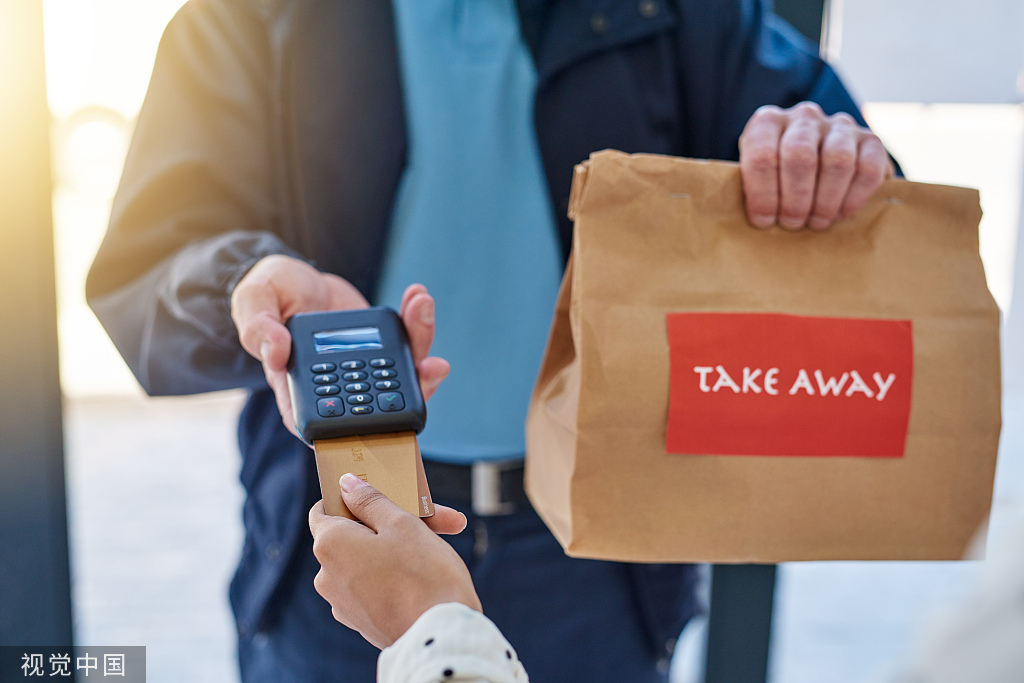Competitors elbow way to Grubhub’s table
By BELINDA ROBINSON in New York | China Daily Global | Updated: 2019-11-12 00:06

It's never been easier to get a meal delivered to a front door in the US with restaurant delivery services like Uber Eats, Grubhub, DoorDash, Postmates and Deliveroo on hand.
But competition is heating up in the online food delivery market as customers put low prices ahead of loyalty.
Grubhub, which also owns the service Seamless, learned that last month when it suffered a big third-quarter earnings miss. Its shares lost more than 40 percent, and analysts downgraded the stock.
Online diners are becoming "more promiscuous", is how CEO Matthew Maloney and president and CFO Adam DeWitt explained the loss to shareholders.
There are around 10 food-delivery companies in North America. Chicago-based Grubhub had been the largest in the US, with at least a third of the market for years, but it lost the No. 1 sales slot to private company DoorDash in May.
"The food delivery space is getting increasingly crowded as new entrants gain traction,'' according to an exclusive report shared with China Daily by tech research firm CB Insights.
It noted that five food-delivery platforms have raised more than $1.5 billion, including DoorDash (nearly $2 billion in funding), the UK's Deliveroo ($1.5 billion), Germany's Delivery Hero ($1.7 billion) and China's Ele.me ($3.3 billion).
In a letter to investors before its share-price drop, Grubhub touted its "highly lucrative relationship" with small- and medium-sized restaurants as its winning formula because they generated 80 percent of its orders. However, those ties have led to problems.
"Reduction in market share … forced the company to look for new ways to cut costs and keep net income up, including by squeezing more money out of restaurants, which has caused a backlash against the company," CB Insights said.
"Grubhub got into trouble for allegedly … setting up restaurant websites that appear to be hosted by restaurants themselves, but instead are directed through Grubhub — and restaurants are charged up to 20 percent in additional fees for these site orders, on top of the company's normal charges of 3-15 percent," CB Insights said.
At least 30 New York City council members wrote a letter to Maloney asking him to address the accusations. Grubhub is also facing a multimillion-dollar lawsuit in Philadelphia over "unfair" fees.
Grubhub has denied the allegations.
Restaurants are increasingly working with third-party food delivery services. They pay to list their menus on the services' apps. If they want to rank higher, they must pay more.
The expenses have led some restaurants to drop exclusive partnerships with a single platform in favor of working with a few. Now Grubhub plans to work with unpartnered restaurants.
A spokesman for the National Restaurant Association told China Daily: "The rapid acceleration of technology in the restaurant space has increased the number of options available to consumers wanting to enjoy a restaurant meal at home.
"In 2013, digital orders accounted for 2 percent of all restaurant orders, today that number has jumped to more than 7 percent and will continue to rise."
A National Restaurant Association survey showed that "38 percent of adults reported they are more likely to have restaurant food delivered today than they were two years ago. Most operators offering delivery reported using a third-party delivery provider to help meet customer demand."
Restaurants in New York City can face an ordering and delivery commission as high as 30 percent. The state liquor authority wants to replace that with a 10 percent commission cap.
One of Grubhub's main US rivals is Uber Eats, worth an estimated $20 billion with revenue of $1.4 billion a year. Launched in 2014, it came off the back of Uber, the ride-sharing company, and delivers almost 1 billion meals a year in 670 cities on six continents.
Food-delivery services are a massive global industry. In Europe, larger companies are acquiring smaller ones. In the Netherlands, Takeaway.com bought Delivery Hero in Germany for $1.1 billion in 2018. Takeaway also owns delivery services in Romania, Bulgaria and Greece.
Last month, Takeaway signaled that it was interested in merging with Just Eat in the UK, which could create a company worth $11 billion with access to 40 million people.
In China, the food delivery services market is worth $37 billion, according to a report from iimedia. More than 256 million people in China used the services in 2017; today that number is 355 million.
Low-cost services are available in 1,300 cities. The two biggest companies are Meituan Dianping, backed by Tencent, and Ele.me, backed by Tencent rival Alibaba.
Swiss investment bank UBS now sees the global online food-delivery market expanding from $35 billion today to $365 billion by 2030.
"The vast majority of younger consumers are interested in this [food delivery] technology," said Hannah Spencer, a food service analyst for research firm Mintel told China Daily, "with 78 percent of iGeneration/Generation Z consumers and 68 percent of millennials planning to order delivery via a third-party app in 2019."
























